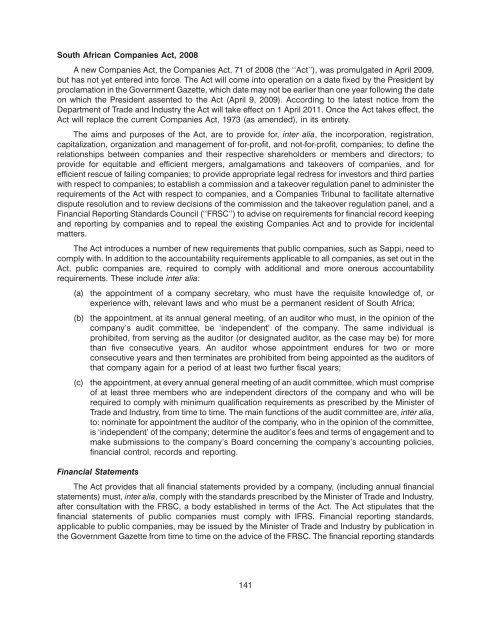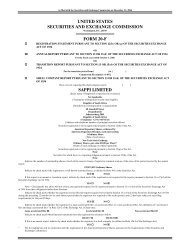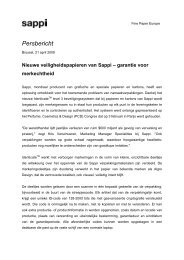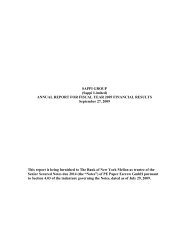You also want an ePaper? Increase the reach of your titles
YUMPU automatically turns print PDFs into web optimized ePapers that Google loves.
South African Companies Act, 2008<br />
A new Companies Act, the Companies Act, 71 of 2008 (the ‘‘Act’’), was promulgated in April 2009,<br />
but has not yet entered into force. The Act will come into operation on a date fixed by the President by<br />
proclamation in the Government Gazette, which date may not be earlier than one year following the date<br />
on which the President assented to the Act (April 9, 2009). According to the latest notice from the<br />
Department of Trade and Industry the Act will take effect on 1 April 2011. Once the Act takes effect, the<br />
Act will replace the current Companies Act, 1973 (as amended), in its entirety.<br />
The aims and purposes of the Act, are to provide for, inter alia, the incorporation, registration,<br />
capitalization, organization and management of for-profit, and not-for-profit, companies; to define the<br />
relationships between companies and their respective shareholders or members and directors; to<br />
provide for equitable and efficient mergers, amalgamations and takeovers of companies, and for<br />
efficient rescue of failing companies; to provide appropriate legal redress for investors and third parties<br />
with respect to companies; to establish a commission and a takeover regulation panel to administer the<br />
requirements of the Act with respect to companies, and a Companies Tribunal to facilitate alternative<br />
dispute resolution and to review decisions of the commission and the takeover regulation panel, and a<br />
Financial Reporting Standards Council (‘‘FRSC’’) to advise on requirements for financial record keeping<br />
and reporting by companies and to repeal the existing Companies Act and to provide for incidental<br />
matters.<br />
The Act introduces a number of new requirements that public companies, such as Sappi, need to<br />
comply with. In addition to the accountability requirements applicable to all companies, as set out in the<br />
Act, public companies are, required to comply with additional and more onerous accountability<br />
requirements. These include inter alia:<br />
(a) the appointment of a company secretary, who must have the requisite knowledge of, or<br />
experience with, relevant laws and who must be a permanent resident of South Africa;<br />
(b) the appointment, at its annual general meeting, of an auditor who must, in the opinion of the<br />
company’s audit committee, be ‘independent’ of the company. The same individual is<br />
prohibited, from serving as the auditor (or designated auditor, as the case may be) for more<br />
than five consecutive years. An auditor whose appointment endures for two or more<br />
consecutive years and then terminates are prohibited from being appointed as the auditors of<br />
that company again for a period of at least two further fiscal years;<br />
(c) the appointment, at every annual general meeting of an audit committee, which must comprise<br />
of at least three members who are independent directors of the company and who will be<br />
required to comply with minimum qualification requirements as prescribed by the Minister of<br />
Trade and Industry, from time to time. The main functions of the audit committee are, inter alia,<br />
to: nominate for appointment the auditor of the company, who in the opinion of the committee,<br />
is ‘independent’ of the company; determine the auditor’s fees and terms of engagement and to<br />
make submissions to the company’s Board concerning the company’s accounting policies,<br />
financial control, records and reporting.<br />
Financial Statements<br />
The Act provides that all financial statements provided by a company, (including annual financial<br />
statements) must, inter alia, comply with the standards prescribed by the Minister of Trade and Industry,<br />
after consultation with the FRSC, a body established in terms of the Act. The Act stipulates that the<br />
financial statements of public companies must comply with IFRS. Financial reporting standards,<br />
applicable to public companies, may be issued by the Minister of Trade and Industry by publication in<br />
the Government Gazette from time to time on the advice of the FRSC. The financial reporting standards<br />
141
















